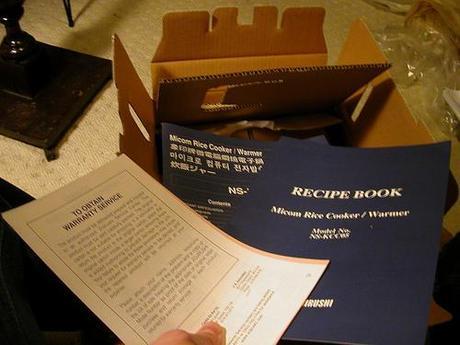
Photo by Justin Henry.
It’s finally here. Your brand new appliance has arrived, and like a kid at Christmas you remove the packaging and marvel at your new major appliance.
But what’s this? The product manual. You set it aside; how hard an it be to use a refrigerator, washing machine or microwave anyway? If you need to look something up later, then you can always refer to the manual.
However, it is becoming increasingly important to read the appliance manual through at least once when you first get your new appliance. Here are several reasons why.
Set Up Instructions
Your major appliances have dozens of moving parts, and have to be packed to be transported from the place of manufacture to distribution centers, from there to your retailer’s warehouse, and then finally to you – and that’s the short route.
To ensure the appliance’s many moving parts and systems are not damaged, measures such as locks are put in place to minimize movement during travel. These systems need to be properly disengaged before first use or they can cause serious damage.
I got the chance to witness a rather widespread case of this user error when I worked for a local retailer. The store manager was thrilled that we were offering these massage chair pads, and they were a hot seller one holiday season. The pads were also one of the top items to be returned as non-functioning. When I an my fellow workers inspected the products, in just about every case the tab that locked the massage head in place for transit had not been removed before the product was used, despite warnings in the product instructions.
With a major appliance, being sure that everything is ready before you turn it on the first time can spare you a costly mistake.
Safety Information
You might not think it’s all that dangerous to use your refrigerator, but a 2011 report of the US Consumer Product Safety Commission revealed that 25 people were killed by appliances (including refrigerators) falling on them in the 2000′s. Another 1,700 were treated at their local emergency room for being hit by a toppling appliance.
How to properly balance your refrigerator is just one of the safety concerns you should have, which your appliance manual can address. A stove, range, oven, and dishwasher all utilize heat and strong electric currents or gas to do their job.
You need to not only be familiar with how to use your new appliance safely, but for the steps to take if something should go wrong.
Parts And Component Information
It may not be obvious what goes where with your new appliance and its accessories. What goes where, and what for what is it used? While appliances may not have a lot of pieces, sometimes there is some minor assembly required.
Sometimes too, mistakes happen and parts are missing. We were using our new shop vac for months before we realized that a filter sleeve was left out of it. A quick call to the manufacturer got us the sleeve (and some other consumable parts as a complimentary gift to make up for the error). Of course, this was after the vacuum had been spewing dust back out the other side for months.
Proper Maintenance
You might think you know how to care for your new appliance, but sometimes research or changes in materials can have surprising results.
To cite one example, there have been numerous reports of stainless steel appliances rusting. Dismayed and angry consumers assumed stainless steel was impervious to rust (it is not) and in some cases could have accelerated the process by improper cleaning.
With rapidly advancing technology innovations, the proper care for your appliances can change with every new one you purchase. Make sure you are up to date, and read you manual.
How To Use It
It’s a refrigerator, right? How hard can it be to use?
The sad fact is that every appliance that gets damaged for being used improperly is because of willful ignorance. The manual explains the proper steps for correct usage, and the user did not read them.
Sometimes the result is a blender that spews smoothie all over the ceiling and cabinets. Other times it is a flooded home from a washing machine. Or it could be a washing machine or dishwasher that bubbles over or is severely damaged from the wrong soap being used.
Special Features
I must admit, it is really funny and uplifting to show someone a special feature of something they have owned for years. The surprise and amazement can be a joy, but then, how long had they missed out on using the feature?
In some cases, the special feature can lead to confusion about the proper working of the appliance. A safety feature or automatic shut off that is improperly set can lead you to think your new appliance is broken when it is not. This can cost you lost time calling for support, or at worse a repair bill for something that was not actually broken.
New Technology
New technology is all around us, and sometimes we get lulled into a false sense of simplicity when we use something that we’ve used for years, like a range or dryer. However, sometimes the technology makes a leap and we need to learn what has changed.
Just in the case of ranges, do you know what types of pans you can and cannot use with an induction range? Self-cleaning ovens may have been around for quite a while, but some new ranges use a faster, cooler method that requires you to spray water inside.
Warranty Information
What is and is not covered by your warranty? Many people miss out on repair or replacement parts that might have been covered by the warranty, or wrongly assume that the warranty is in effect for things that are not covered. Make sure to give the guidelines a read-through before setting the product manual aside.
Sometimes the warranty requires prior registration. Calling the company when things break down, but you never registered, can lead to additional hurdles when you are already frustrated.
Service Information
More and more products are directing customers to call the manufacturer, not the retailer, when things go wrong or parts are missing. This avoids unnecessary costs in replacing the part, and can drag out the process of getting your appliance working quickly.
What routine service may be required? Who should you call if things break down? These questions are answered in your appliance manual.
Bonus Information
At the time of this writing, at least four brands have offers for free cookware with the purchase of an appliance. Brands sometimes offer these incentives or other gifts with registration. Cooking appliances often come with several free, tested recipes designed specifically for your new unit.
The manufacturer took the time to include some special bonuses with to help you enjoy your new appliance. It’d be a shame if you missed out because you neglected to read the manual when you got the appliance.

